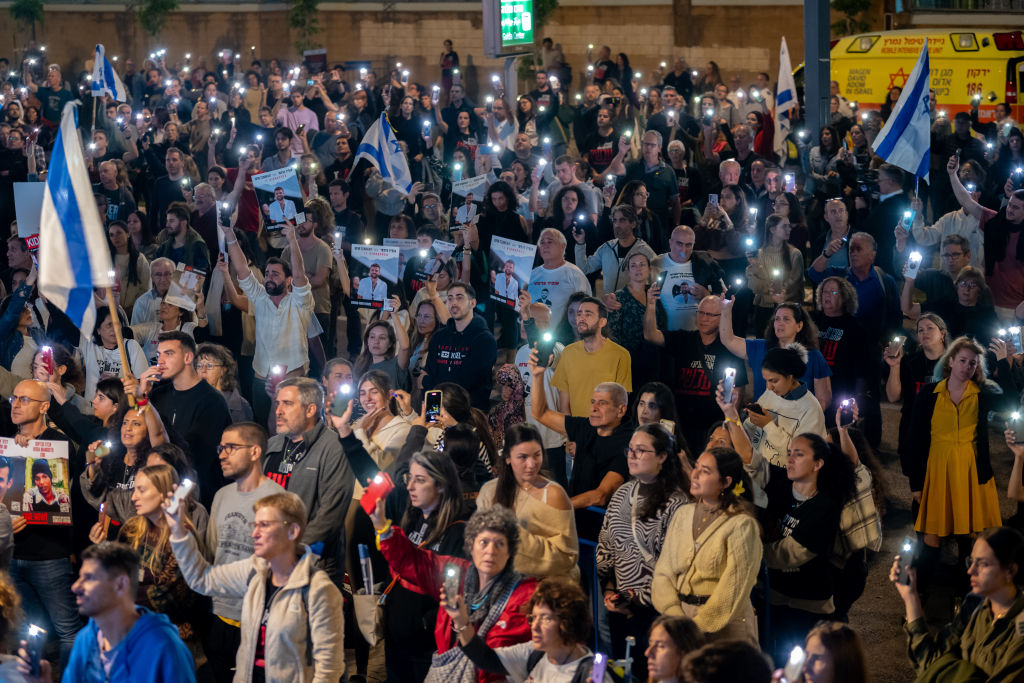Israel Faces Renewed Calls for Hostage Negotiations
Happy Tuesday! The audubon world was rocked by news this week that New York City’s favorite bird—Flaco the owl, who escaped the Central Park Zoo in February—might be a bit of a peeping Tom. The Eurasian eagle-owl’s reputation may never recover.
Quick Hits: Today’s Top Stories
- The trial of Jimmy Lai—a pro-democracy activist, founder of Hong Kong newspaper Apple Daily, and frequent critic of the Chinese government—began in Hong Kong on Monday. Lai, 76, was arrested in August 2020 under China’s national security law, adopted in 2020, which aimed to quell democracy protests in Hong Kong. He faces charges of colluding with foreign forces and conspiring to publish seditious material, and if convicted could spend the rest of his life in prison. The trial is expected to last 80 days.
- North Korea test fired an intercontinental ballistic missile (ICBM) on Monday that reached an altitude of 3,700 miles before falling into the sea west of Japan, according to the Japanese Defense Ministry. The missile has a possible range of 9,300 miles and could reach parts of the U.S., depending on the weight and payload. The launch was North Korea’s fifth such ICBM test this year, and followed a shorter-range ballistic missile test on Sunday.
- Egyptian President Abdel Fattah el-Sisi was reelected to a third term on Monday, winning 89.6 percent of the vote, according to Egypt’s National Election Authority. Although three little-known candidates ran against him, the incumbent’s chances were never threatened by a serious challenger. With his tenure secured until 2030, el-Sisi—in power since 2014—faces a worsening economic crisis and the challenge of navigating growing regional instability.
- British Petroleum (BP) paused all oil shipments through the Red Sea on Monday. “In light of the deteriorating security situation for shipping in the Red Sea, BP has decided to temporarily pause all transits through the Red Sea,” the company said, referencing the increasing frequency and severity of Yemen’s Houthi rebels’ attacks on ships in the waterway. If other oil companies also pause their shipments, oil prices could soon shoot up. Defense Secretary Lloyd Austin on Monday announced the creation of a new “multinational security initiative” under the Combined Maritime Forces—an existing multinational partnership designed to secure international waters—to protect commercial vessels in the Red Sea. Nine countries, including the United Kingdom, Bahrain, and France, are part of the initiative. “This is an international challenge that demands collective action,” Austin said.
- Nippon Steel, Japan’s largest steel company, and U.S. Steel announced on Monday a $14.1 billion deal for Nippon to acquire the iconic 122-year-old American business. U.S. Steel had been looking for buyers since this summer, and Cleveland-Cliffs, a domestic competitor, offered a $7.3 billion takeover deal that U.S. Steel rejected. It’s unclear if the Nippon deal will be completed next year as proposed; the United Steelworkers Union criticized the sale to a foreign corporation, as did Republican Sen. J.D. Vance of Ohio and Democratic Sen. John Fetterman of Pennsylvania. If the deal goes through, U.S. Steel is expected to keep both its name and its Pittsburgh, Pennsylvania, headquarters.
- An earthquake struck the Gansu and Qinghai provinces of northwest China on Monday night, killing more than 100 people and injuring at least 200 others. The United States Geological Survey registered the tremor at a 5.9 magnitude, although the Chinese state news agency reported a 6.2 magnitude.
- The Vatican on Monday approved new guidelines allowing priests to bless same-sex relationships so long as the blessings aren’t treated as a marriage ceremony or performed as part of any church liturgy or service. A brief document published by the Vatican’s doctrinal office affirmed the historic Catholic teaching that marriage is a union between a man and a woman. “It is essential to grasp the Holy Father’s concern that these non-ritualized blessings never cease being simple gestures that provide an effective means of increasing trust in God on the part of the people who ask for them,” the document read, “careful that they should not become a liturgical or semi-liturgical act, similar to a sacrament.”
‘A Sad and Painful Event for All of Us’

On Friday, Israeli Defense Forces (IDF) troops mistakenly killed three Israeli hostages who had escaped Hamas’ capture in a tragic accident that prompted renewed calls both abroad and within Israel for the negotiated release of all hostages. Israeli leaders have vowed to continue their war against Hamas until the terrorist organization is eliminated, even as Western allies—including the U.S.—push for a more targeted campaign that puts greater emphasis on protecting civilian lives.
The IDF on Saturday released information on the operation that led to the deaths of three Israelis: Yotam Haim, Alon Shamriz, and Samer Talalka. The three young men reportedly emerged from a building in Shejaiya, a neighborhood in Gaza City that has seen intense fighting and suicide bombers in recent days, near a cadre of IDF soldiers. The trio were shirtless—an effort to show they were not armed and posed no threat—and waved a white flag. An Israeli soldier, seemingly believing the hostages were part of a Hamas trap, reportedly shouted “terrorists!” and fired at the three men, immediately killing two of them and …
As a non-paying reader, you are receiving a truncated version of The Morning Dispatch. Our full 1,405-word story on the state of the Israel-Hamas war is available in the members-only version of TMD.

Worth Your Time
- Writing for American Purpose, Dalibor Roháč argues that there is a trade-off between pursuing climate policies that reduce oil production and forcefully confronting our adversaries. “The imperative of decarbonization must be and is tempered by other considerations—economic and social, and increasingly also by geopolitical ones,” Roháč writes. “In particular, if there is an extent to which high oil and natural gas prices are driven by our reluctance to expand production further for environmental reasons, then we are unwittingly strengthening regimes that seek to destroy the U.S.-led international system. Our two major adversaries, Russia and Iran, are using oil revenue to fund their respective machines of domestic repression and international revanchism. Allowing their depredations to continue unabated, even though the West has the tools to essentially bankrupt both regimes, represents at least as much of a threat to our future as our supposed complacency about climate change. … Ignore the noise of climate summits, which suggests that climate change has simple solutions impeded only by a lack of political will. In truth, climate change is a ‘wicked problem:’ one that does not have a clear-cut solution because of its incomplete, contradictory, and changing nature. And managing wicked problems in the real world oftentimes requires counterintuitive moves, balancing acts, and hard choices.”
Presented Without Comment
New York City Mayor Eric Adams, asked to describe 2023 in one word: “New York, this is a place where every day you wake up you could experience everything from a plane crashing into our Trade Center to a person who’s celebrating a new business that’s open. This is a very,very complicated city, and that’s why it’s the greatest city on the globe.”
Toeing the Company Line
- In the newsletters: The Dispatch Politics crew interviewed Kevin McCarthy as he prepares to depart Congress, Kevin argued (🔒) the U.S. doesn’t suffer from lack of a resources but a lack of realism about spending levels, and Nick outlined (🔒) the fraught politics of a potential Donald Trump-Nikki Haley ticket.
- On the podcasts: Sarah and David discuss listener comments about last week’s Texas abortion case, unpack special counsel Jack Smith’s delay, and speculate on the second biggest SCOTUS leak on the latest Advisory Opinions.
- On the site today: Chris delves into the significance of Nippon buying U.S. Steel, and Charles Horton explains the newest sickle cell treatments.